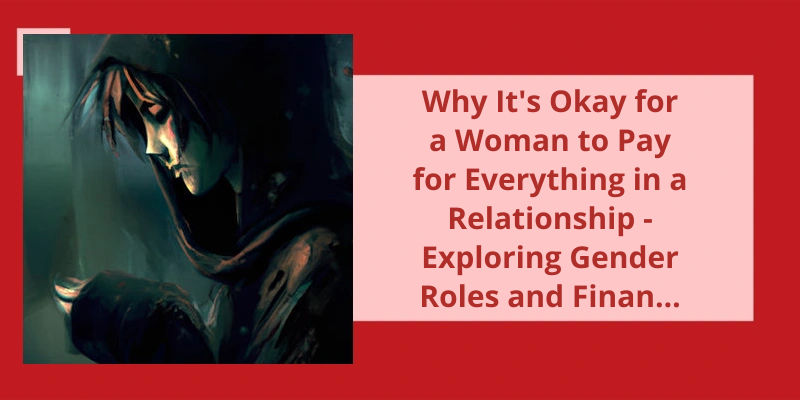The dynamics of romantic relationships are often complex and multifaceted, shaped by a variety of factors including cultural norms, personal preferences, and individual values. One aspect of these dynamics that can often cause friction is the issue of financial responsibility, particularly when it comes to who pays for what. While historically it’s been expected that men take on the bulk of financial responsibility in romantic relationships, more and more women are breaking down these gender norms and taking charge when it comes to footing the bill. However, while this may seem like a positive development in terms of gender equality, it can also create it’s own set of challenges and tensions in relationships. In this essay, we will explore the experiences of women who pay for everything in their relationships, looking at the reasons why they choose to do so and the impact it’s on their personal lives and relationships.
Should a Man Pay All the Bills at Home?
It’s important to recognize that relationships involve a partnership, and that partnership should extend to finances as well. Both individuals should be contributing to the household income, regardless of gender. Not only is this fair, it also ensures that both individuals are invested in the success of the household.
However, this doesn’t mean that splitting bills 50/50 is the only option. Couples can choose to split expenses in a way that makes sense for their specific situation. For example, if one person has a higher income, they may choose to contribute more towards household expenses. The key is to have open communication and come to a mutual understanding about financial responsibilities.
It’s also worth noting that financial equality goes beyond just paying bills. Both individuals should have equal access to financial resources and be able to make decisions about money together. This can include joint bank accounts, shared financial goals, and transparency about spending habits.
Dating has always been a complex topic with varying opinions on who should pay for the first date. While some people still hold on to traditional beliefs that men should pay, there’s a growing number of people who think it’s perfectly fine if a girl pays for the first date. However, there’s more to first dates than just paying the bill.
Is It Okay if the Girl Pays for the First Date?
Despite this, a societal expectation has been set that the man should always pay for the first date. But why should this be the case? It perpetuates gender roles and reinforces the idea that men must be the providers, while women are the receivers. It also puts unnecessary pressure on men to fulfill this expectation and can make women feel uncomfortable if they can’t reciprocate in the same way.
Furthermore, in todays society, women are increasingly financially independent and capable of paying for their own meals. It’s a sign of respect and equality to offer to split the bill or even take turns paying for dates. This approach allows for a more balanced and healthy dynamic in the relationship. Communication is key in any relationship, so discussing financial expectations and preferences before the date can also avoid any potential awkwardness or misunderstandings.
That being said, it’s important to acknowledge that everyone has their own dating preferences and traditions, and there’s no right or wrong way to approach this. The most important thing is mutual respect and understanding.
Offering to split the bill or take turns paying can promote equality and a healthy dynamic in the relationship. At the end of the day, it’s up to each individual to decide what works best for them and their dating preferences. As long as both parties are on the same page and communicate effectively, the issue of who pays for the first date shouldn’t matter in the grand scheme of things.
The Potential for Unequal Power Dynamics in Relationships Where One Person Always Pays for Dates
- The person who always pays may feel a sense of control or superiority in the relationship.
- The person who always pays may feel resentful or taken advantage of if their partner doesn’t reciprocate financially.
- The person who doesn’t pay may feel guilty or inadequate, leading to a power imbalance in the relationship.
- Unequal power dynamics can also be influenced by other factors such as gender, race, or socioeconomic status.
- It’s important for both partners to have open and honest communication about finances and expectations to avoid potential issues and maintain a healthy relationship.
When it comes to dating, there are certain social norms that have been ingrained in us. While some may argue that these norms are outdated, they still play a significant role in our perceptions of a potential partner. One such norm is that the man is expected to pay for the first date. However, what happens when the girl pays for the date? Does it mean anything? In this article, we will explore what it means when a girl pays for a date and what it could potentially signify about her interest in you.
What Does It Mean When Girl Pays for Date?
It’s widely believed that a person paying for a date, especially in a heterosexual relationship, indicates their interest level in the other person. However, this isnt always the case. If a girl pays for a date, it doesn’t necessarily mean that shes not interested in the person shes with. In some cases, it may mean that she wants to maintain a certain level of independence and doesn’t want to feel obligated towards the other person.
There are several other reasons why a girl might choose to pay for a date. For instance, she may believe in splitting the bill equally or taking turns in paying for the date. She may also be more financially secure or earn more than the person shes with. Additionally, some girls may simply enjoy treating their partners to a nice evening out, without any strings attached.
It’s important to note that paying for a date doesn’t necessarily indicate a persons interest level, as there are other factors that come into play such as personal values and beliefs, financial situations, and cultural norms.
Ultimately, the best way to gauge someones interest level is through open and clear communication. If a girl pays for a date and shows genuine interest in the person shes with, she’ll likely make it clear through her words and actions. It’s important to avoid making assumptions and instead, have an open and honest conversation about what each person is looking for in a relationship.
Instead, focusing on clear communication and understanding each others values and beliefs is essential for building a strong and healthy relationship. Ultimately, the most important factor is finding someone who respects and values you, regardless of who pays for the date.
How to Build a Healthy Relationship That Values Mutual Respect and Understanding Regardless of Who Pays for the Date
To create a healthy relationship that values mutual respect and understanding, focus on open communication, active listening, and empathy. Don’t let financial contributions dictate the power dynamic in the relationship. Instead, work together to find a balance that feels comfortable for both parties. Show appreciation for each other’s efforts and prioritize spending quality time together. Remember that a healthy relationship is built on love and understanding, not who pays for the date.
Paying for a date can raise some questions about gender roles and money. While some couples may not think twice about splitting the bill, others may have differing opinions. In any case, it’s important to communicate openly and find a solution that works for both parties.
Is It OK to Split the Bill With Your Girlfriend?
However, the idea of splitting the bill has become popular in recent years, and more couples are opting for this approach. Some argue that splitting the bill takes the pressure off both individuals and keeps things fair. After all, why should one person be responsible for paying for everything when both are enjoying the date? Splitting the bill can also help avoid awkwardness or feelings of obligation.
Ultimately, what matters most is that both partners are happy and comfortable with the decision. Whether it’s splitting the bill or taking turns paying, it’s important to find a system that works for both partners. As long as both individuals communicate openly and honestly about their preferences and expectations, theres no reason why splitting the bill cant be a successful approach to dating.
Does Splitting the Bill Impact Gender Roles in Relationships?
This topic explores the effects of splitting the bill on gender roles in relationships. It raises the question of whether this practice has an impact on traditional gender roles and expectations within a romantic partnership.
The issue of who pays on a date has long been a topic of debate, with varying opinions on the matter. While some believe that it’s the responsibility of the man to foot the bill, others argue that in a world where gender equality is advocated for, both parties should be comfortable enough to split the cost. However, the question remains – should a girl pay if she asks a guy out? Let’s explore this further.
Should a Girl Pay if She Asks a Guy Out?
The concept of who pays on a date has always been a contentious issue. While some believe that the guy should always pay, others believe in equal rights regardless of gender. With changing times, it’s become a more commonly accepted idea that whoever asks for the date should foot the bill. If a girl decides to ask a guy out, then it’s only natural for her to assume that she should be prepared to pay. This doesn’t mean that the guy can’t pay or that he’s expected to split the bill. This is a decision for the two people involved in the date, based on their preferences and communication.
However, the debate doesn’t just end with the idea of who pays. It’s important to take into consideration the dynamics of the relationship as well. If the two individuals are comfortable with each other, the issue of who pays may not matter as much. It may be an insignificant detail in the grand scheme of things. It’s all about communication between partners and being mindful of each others thoughts and feelings.
The issue of who pays on a date isn’t just about dollars and cents. It’s a reflection of the values and expectations of each person involved. It can represent traditional gender roles or a willingness to challenge societal norms. Setting expectations from the get-go can help in avoiding misunderstandings and awkwardness. Dating is a two-way street, and it isn’t about gender or the balance of power. It’s about two individuals making a connection and enjoying each others company.
However, today’s modern couples are breaking away from traditional gender roles and dividing financial responsibilities based on each individual’s strengths and interests. In this article, we will explore the different approaches that couples can take to manage their finances together, and the benefits and drawbacks of each.
Who Should Be Responsible for Finances in a Marriage?
However, it’s important to note that in todays society, gender roles are becoming less defined and more fluid. As such, the question of who should be responsible for finances in a marriage isn’t so cut and dry. Instead, it’s best to determine financial responsibilities based on each partners strengths and weaknesses.
For example, if one partner has a background in finance or accounting, it may make sense for them to handle the day-to-day finances, such as bill paying and budgeting. On the other hand, if the other partner is more skilled in long-term planning and investment strategies, they may handle retirement accounts and tax planning.
In some cases, it may be beneficial for both partners to have equal responsibility for finances. This can lead to better communication and decision-making, as both partners have a full understanding of their financial situation. It also ensures that both partners have a say in how money is spent and invested.
Both partners must trust that the other is making responsible financial decisions and managing money wisely. This can be achieved through transparency, such as sharing access to bank accounts and credit cards, and a commitment to open communication about financial matters.
With open communication, trust, and a commitment to financial responsibility, couples can work together to achieve their financial goals and build a strong foundation for their future together.
Tips for Couples to Manage Finances Together Effectively
- Communication is key: discuss your financial goals and priorities.
- Create a shared budget: outline your income, expenses, and savings.
- Hold each other accountable: establish check-ins and review your progress regularly.
- Be transparent: share information about debts, credit scores, and financial history.
- Share responsibility: divide financial tasks and responsibilities fairly.
- Consider a joint account: use it to pay bills and save for shared goals.
- Find ways to save: look for areas to cut back expenses and increase income.
- Discuss long-term goals: plan for retirement, emergencies, and major purchases together.
- Don’t be afraid to seek help: consider financial counseling or coaching if needed.
Source: Sharing Financial Responsibility in Marriage – TrueNorth Wealth
Conclusion
In conclusion, the concept of women paying for everything in a relationship is a complex and multifaceted issue that can’t be fully addressed through simplistic generalizations or assumptions. There are many different factors that can influence a woman's decision to take on a greater financial burden in a relationship, including cultural expectations, personal values, and economic circumstances. While it’s important to acknowledge and address any potential power imbalances or inequalities that may arise from this dynamic, it’s also crucial to recognize and respect the agency and autonomy of individual women in making their own choices about how they want to navigate their relationships and finances. Ultimately, a healthy and equitable relationship requires open communication, mutual respect, and a willingness to work together to build a sustainable partnership that meets the needs and goals of both parties.






